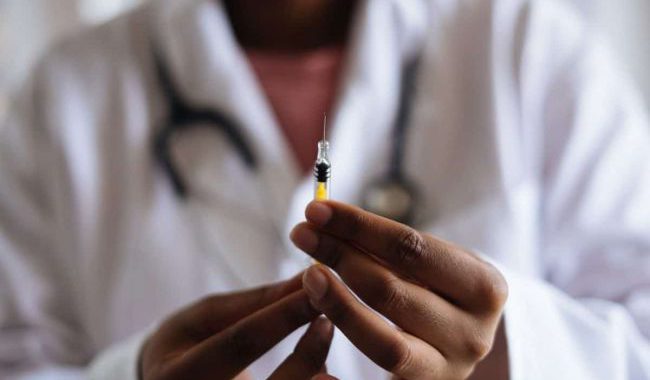UK approves Pfizer-BioNTech COVID-19 vaccine, first in the world

Syringes are seen in front of displayed Biontech and Pfizer logos in this illustration
(photo credit: REUTERS)
Britain on Wednesday became the first western country to approve a COVID-19 vaccine jumping ahead of the United States and Europe after its regulator cleared a shot developed by Pfizer for emergency use in record time.
The vaccine will be rolled out from early next week in a major coup for Prime Minister Boris Johnson’s government, which has faced criticism over its handling of the coronavirus crisis with Britain enduring the worst official COVID-19 death toll in Europe.
A vaccine is seen as the best chance for the world to get back to some semblance of normality amid a pandemic which has killed nearly 1.5 million people and upended the global economy.
“The government has today accepted the recommendation from the independent Medicines and Healthcare products Regulatory Agency (MHRA) to approve Pfizer-BioNTech’s COVID-19 vaccine for use,” the government said.
Britain touted the approval as a global win and a ray of good hope amid the gloom as big powers race to approve an array of vaccines and inoculate their citizens.
“I’m obviously absolutely thrilled with the news, very proud that the UK is the first place in the world to have a clinically authorised vaccine,” British Health Secretary Matt Hancock said.
China has already given emergency approval for three experimental vaccines and has inoculated around 1 million people since July. Russia has been vaccinating frontline workers after approving its Sputnik V shot in August before it had completed late-stage testing on safety and efficacy.
SKIP AD
‘HISTORIC MOMENT’
Pfizer and its German partner BioNTech have said their vaccine is 95% effective in preventing illness, much higher than expected.
The US drugmaker said Britain’s emergency use authorization marks a historic moment in the fight against COVID-19.
“This authorization is a goal we have been working toward since we first declared that science will win, and we applaud the MHRA for their ability to conduct a careful assessment and take timely action to help protect the people of the UK,” said CEO Albert Bourla.
“As we anticipate further authorizations and approvals, we are focused on moving with the same level of urgency to safely supply a high-quality vaccine around the world.”
Britain’s medicines regulator approved the vaccine in record time. Its US counterpart is set to meet on Dec. 10 to discuss whether to recommend emergency use authorization of the Pfizer/BioNTech vaccine and the European Medicines Agency said it could give emergency approval for the shot by Dec. 29.
“The data submitted to regulatory agencies around the world are the result of a scientifically rigorous and highly ethical research and development program,” said Ugur Sahin, chief executive and co-founder of BioNTech.
FIRST IN LINE?
Britain’s vaccine committee will decide which priority groups will get the jab first: care home residents, health and care staff, the elderly and people who are clinically extremely vulnerable will be first in line.
Hancock said hospitals were ready to receive the shots and vaccination centres would be set up across the country but he admitted distribution would be a challenge given that the vaccine must be shipped and stored at -70C, the sort of temperature typical of an Antarctic winter.
Pfizer has said it can be stored for up to five days at standard refrigerator temperatures, or for up to 15 days in a thermal shipping box.
Johnson said last month that Britain had ordered 40 million doses of the Pfizer vaccine – enough for just under a third of the population as two shots of the jab are needed per person to gain immunity.
Other frontrunners in the vaccine race include U.S. biotech firm Moderna, which has said its shot is 94% successful in late-stage clinical trials. Moderna and Pfizer have developed their shots using new messenger RNA (mRNA) technology.
AstraZeneca said last month its COVID-19 shot, which is based on traditional vaccine technology, was 70% effective in pivotal trials and could be up to 90% effective.









